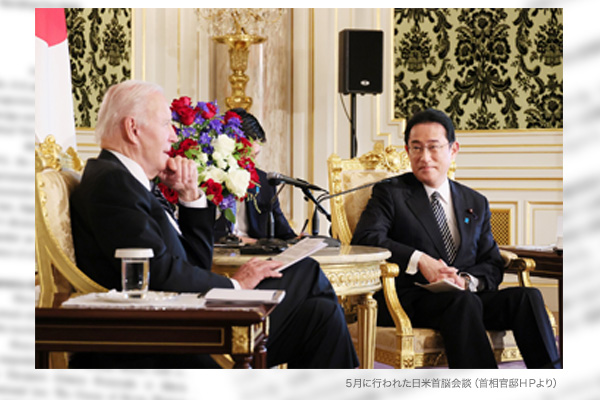At a Japan-U.S. summit in May, Prime Minister Fumio Kishida vowed to fundamentally reinforce Japan’s defense capabilities, increase defense spending needed to effect it and examine all options necessary for national defense, including the possession of counterstrike capabilities. U.S. President Joe Biden strongly supported Kishida’s determination.
In June, the Kishida government decided on the Basic Policy on Economic and Fiscal Management and Reform 2022 that cited a defense spending target at more than 2% of gross domestic product (GDP) for the members of the North Atlantic Treaty Organization (NATO) and clarified a plan to fundamentally reinforce Japan’s defense capabilities within five years. Given the short duration of five years, the government will have to take relevant measures speedily. But arguments we hear recently seem to miss the point.
Apparent attempt to superficially increase defense budget
The government has reportedly been considering to form a new “defense related budget” framework that will cover not only spending at the Defense Ministry but also infrastructure development, space and cyber related expenses, and science and technology research costs controlled by other government agencies.
The new framework is commended as useful for excluding bureaucratic sectionalism, for preparing for emergencies in a cross-sectoral manner, for leading all government agencies to easily cooperate in reinforcing defense capabilities and for increasing the effectiveness of national security policy through cross-sectoral cooperation. But it is explicitly designed to make it easier to achieve the defense spending target at 2% of GDP by including expenses of various agencies into the framework, instead of boosting spending at the Defense Ministry per se.
What Japan should do now is to fundamentally reinforce defense capabilities within five years. Defense spending’s expansion to 2% of GDP is nothing more than tools for the reinforcement. The defense spending target at 2% of GDP is emphasized so much that the government may be trying to increase defense spending by combining defense-related expenses at all government agencies. This represents a superficial defense spending increase or a push-up bottom for defense capabilities, with the fundamental reinforcement of defense capabilities being set aside. Such manipulation is preposterous. Under the framework, government agencies other than the Defense Ministry may race to increase their respective spending by disguising various expenses as related to defense. Consequently, expenses required to reinforce defense capabilities could be suppressed.
Unreasonable argument for including coast guard expenses into defense spending
There are argument that the Japan Coast Guard budget should be included in the defense budget as NATO regards coast guard expenditure as part of defense spending. This argument as well is unreasonable. Some experts say that NATO countries do not necessarily include coast guard expenses into defense spending. Furthermore, the Japan Coast Guard is an organization designed only to enforce police power. Its missions are limited to the maintenance of maritime traffic safety and security. Even territorial patrol operations are not included in its mission. While other countries treat the coast guard as the fourth military branch after the army, navy and air force, Japan does not do so. If the Japan Coast Guard budget is to be included into the defense budget, Japan has to delete the Japan Coast Guard Act’s Article 25 that bans military operations by the coast guard.
Any superficial defense spending increase to meet the numerical target should not be a goal. The government should hold fast to the fundamental reinforcement of defense capabilities.
Kunio Orita is a member of the JINF Planning Committee and a special professor at Reitaku University. He is a retired Lieutenant General of the Japan Air Self-Defense Force.


